The General Data Protection Regulation (GDPR) is often considered the strictest regulation in the world for securing users’ personal data, with fines for non-compliance reaching more than €20 million. The GDPR applies to all organizations processing the personal data of European Union (EU) residents.
Do you find it daunting to read through the complex articles of this regulation? Read on to explore the nature and key principles of the GDPR and learn how to become GDPR-compliant in ten simple steps. This article will be helpful for companies that already follow the GDPR and those planning to enter the EU market.
What is the GDPR?
The General Data Protection Regulation is a data privacy and security regulation adopted by the EU and put into effect on May 25, 2018. The GDPR imposes obligations on all organizations that collect and process personal data of EU residents, even if these organizations operate outside the EU.
The GDPR provides EU residents with control over their personal data and obliges organizations to:
- Gather, collect, and manage personal data legally and according to strict rules
- Protect personal data from misuse, exploitation, and compromise
- Respect the rights of individuals to control their data
The GDPR’s two primary focus areas are personal data and data processing:
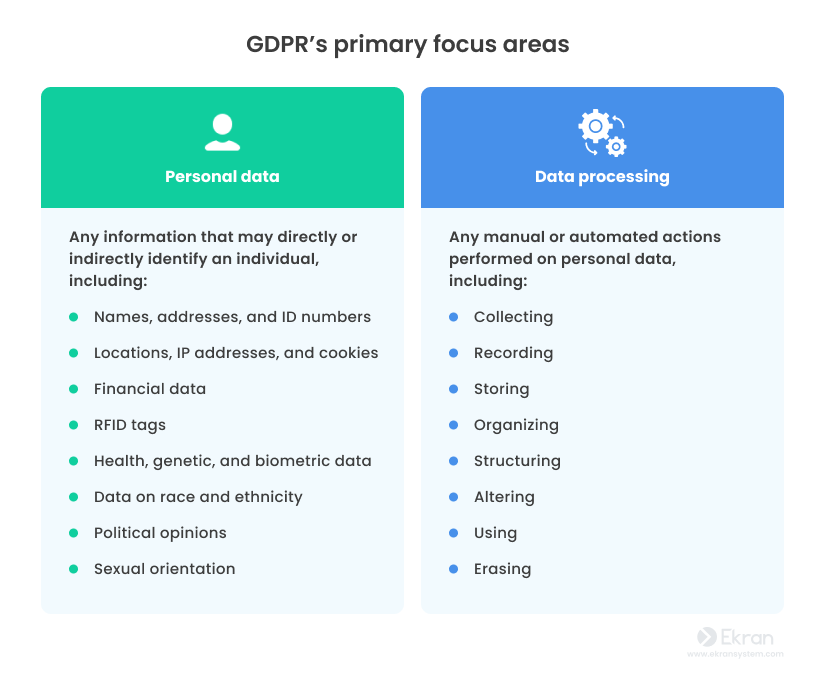

It’s also important to be familiar with specific GDPR terms for defining roles associated with data handling: data controllers, data subjects, and data processors.
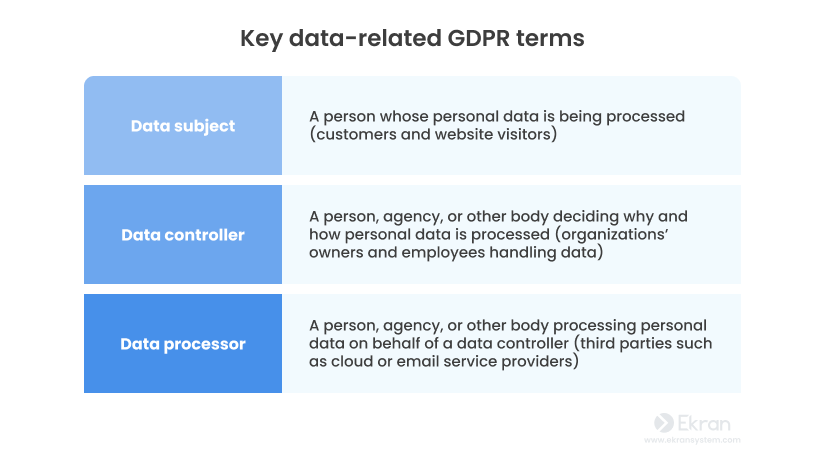

Who must comply with the GDPR?
Any organization that stores or processes personal information of EU residents is obliged to comply with the GDPR, even if the organization is located outside the EU.
The GDPR currently protects personal data of residents in the following countries:
| List of countries covered by the GDPR | |||
Note: The GDPR still applies to UK residents after Brexit, as the United Kingdom has retained identical requirements in its own UK-GDPR.
There are some exceptions, however. Organizations with fewer than 250 employees are free from the majority of record-keeping obligations (see Article 30.5) unless their processing of personal data:
- is likely to result in a risk to the rights and freedoms of data subjects
- is not occasional
- includes special categories of data described in Article 9
- includes personal data relating to criminal convictions and offenses described in Article 10
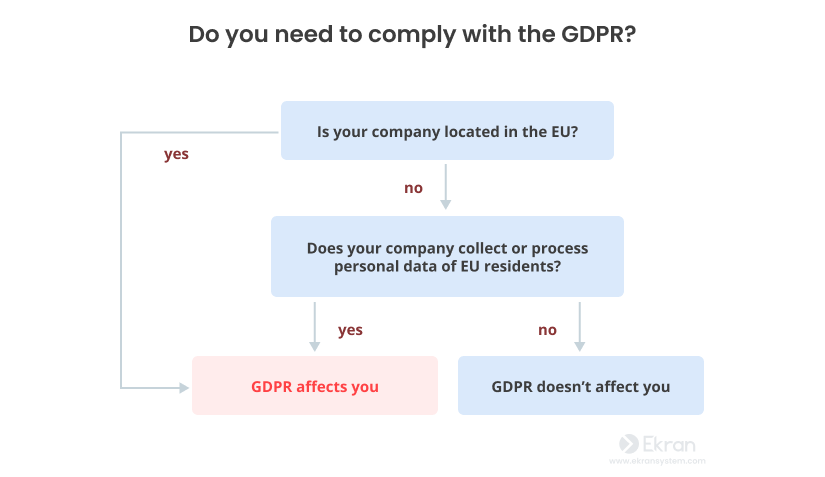

Cloud Infrastructure Security: 7 Best Practices to Secure Your Sensitive Data
Why should you comply with the GDPR?
Meeting GDPR requirements can help your organization to:


Protect customer and employee data
The GDPR sets high standards for personal data security, obliging data controllers and processors to protect sensitive personal data. Ensuring secure data processing is a reliable way to minimize the risk of security incidents.
Maintain your reputation
Neglecting data privacy regulations may harm your reputation. For example, experiencing a data breach will lead to investigations, fines, and potential lawsuits. Staying compliant with GDPR requirements can help you avoid data breaches and maintain the status of a trustworthy and professional organization in the public eye.
Ensure customer loyalty
People want to know that their data is safe and they have control over it. Customers and businesses are more likely to choose a GDPR-compliant service provider or subcontractor than a non-compliant one.
Avoid fines and lawsuits
Non-compliance with the GDPR may lead to investigations, penalties, and even data breaches. Up to 110,000 personal data breaches have been reported to GDPR regulators between 2022 and 2023, resulting in a total of nearly €1.64 billion (≈ $1.74 billion) in fines.
Fines for non-compliance may reach up to 4% of annual global turnover or €20 million (whichever is greater). The largest GDPR fine so far paid by a single company was €746 million (≈ $790 million). The size of a fine depends on multiple factors, including:
- The duration and severity of the violation
- The degree of cooperation with the supervisory authority
- The categories of personal data affected
The GDPR compliance process requires a deep understanding of the regulation. So before proceeding to the GDPR data protection checklist, let’s take a quick look at the fundamental principles behind the GDPR.
Using Ekran System for GDPR compliance
Key principles of the GDPR
GDPR requirements are based on the seven principles laid out in Chapter 2. They embody the main ideas of the regulation and explain the key reasons for implementing its requirements.
Compliance with these principles is essential for reliable data protection in general and compliance with the detailed provisions of the GDPR in particular.
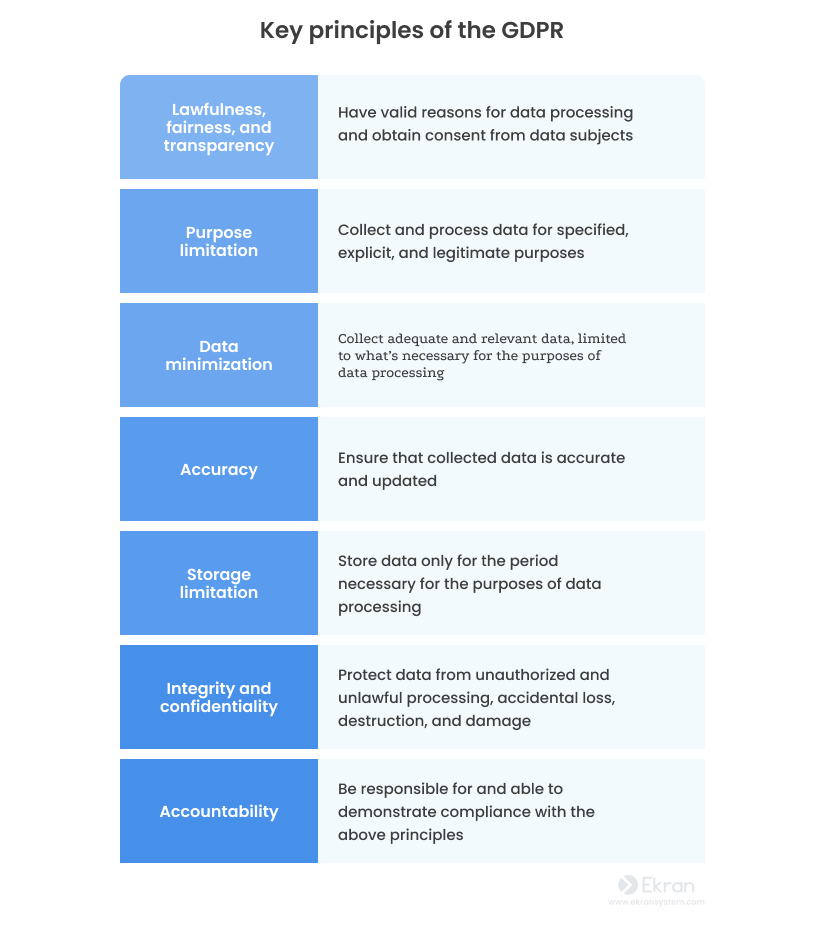

The next section offers ten basic steps for GDPR compliance.
Data Loss Prevention (DLP) Systems: Main Advantages and Disadvantages
How to comply with the GDPR
Even though there are no mandatory audits to confirm GDPR compliance, organizations can’t simply get away with non-compliance. If a data breach or a violation of data subjects’ rights occurs, supervisory authorities and regulators will investigate the incident and check the organization’s compliance.
To both minimize the risk of data breaches and avoid fines, your company may use our GDPR checklist to ensure it meets major GDPR requirements.


1. Ensure lawfulness and transparency of data processing
The GDPR requires establishing a lawful basis for and a transparent method of data processing. To do so, follow these six practices:
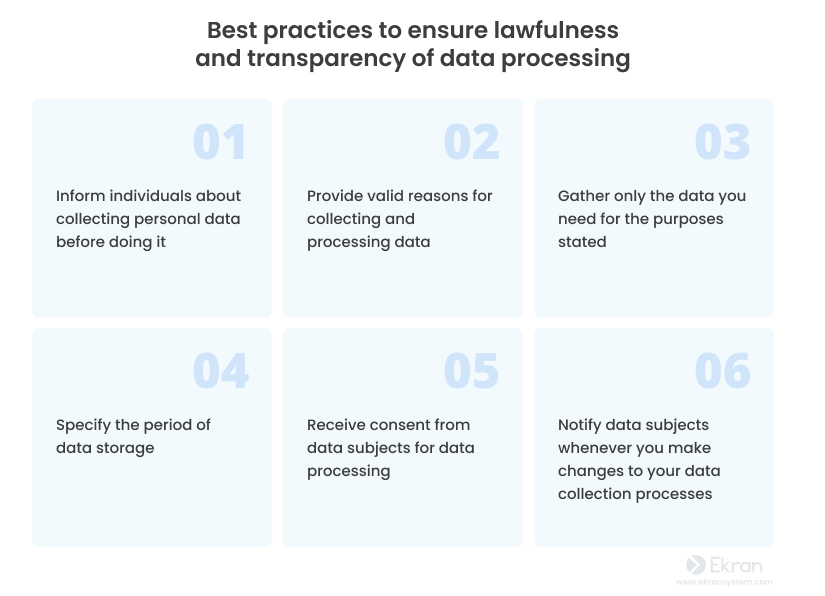

Asking for users’ consent has some nuances. It’s important that the user agrees to the processing of their data, so make sure to receive consent through some sort of opt-in action, such as clicking a checkbox.
It’s also a good decision to provide clear and concise information about data collection, storage, and processing. All this information should be easily accessible.
2. Review your data protection policies
Another thing that will help you comply with the GDPR is developing and implementing a GDPR-compliant data protection policy. If you already have one, make sure to review it regularly.
Ensure that your data protection policy unites all other security policies and implements the privacy by design principle, which implies making privacy an integral part of your IT infrastructure by default.
Consider conducting regular self-audits with respect to GDPR compliance. The goal here is to validate that personal data is collected, stored, and processed securely and isn’t accessible to more individuals than necessary. Also, check that your systems process only the categories of personal data needed for your specific purposes.
Major Supply Chain Cybersecurity Concerns and 7 Best Practices to Address Them
3. Сonduct a data protection impact assessment
A data protection impact assessment (DPIA) is a process designed to identify and mitigate the risks imposed by personal data collection and processing. A clear understanding of data privacy risks can help you choose the proper security measures and develop relevant cybersecurity policies.
A DPIA starts with an inventory of all processes related to personal data collection and processing. Then, there’s the assessment of risks to the rights and freedoms of data subjects.


To conduct a proper DPIA, you may refer to the sample DPIA template offered by the GDPR. Article 35 of the GDPR also states that your organization shall seek the advice of the data protection officer when performing a DPIA.
4. Implement proper data security measures
No data is secure without relevant controls and protection mechanisms. Your cybersecurity software measures are worth special attention, as they’re the foundation for your data protection.
To ensure GDPR compliance and improve data security, consider implementing the following cybersecurity solutions:
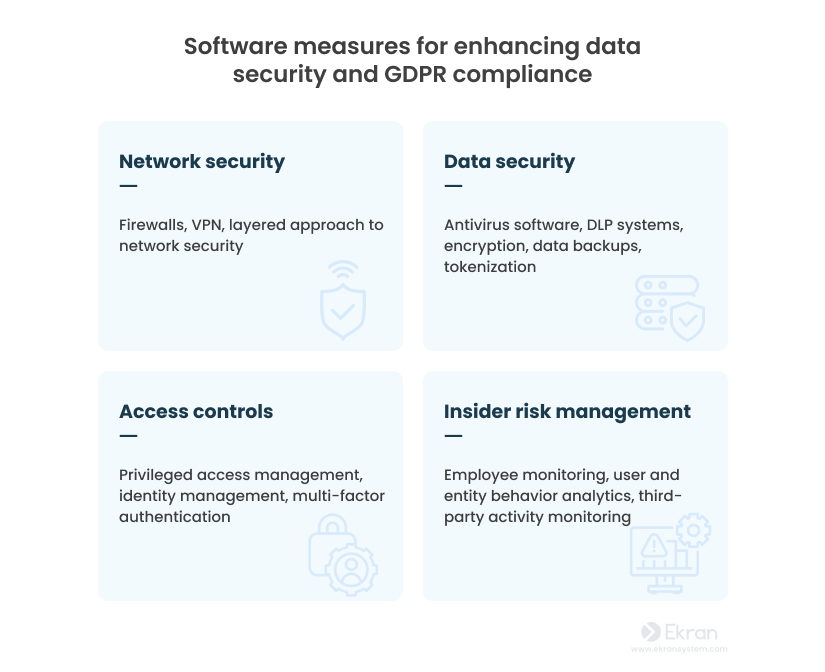

5. Ensure users’ privacy rights
Chapter 3 defines the rights of data subjects you should guarantee in order to ensure GDPR compliance.
Make sure to review the privacy rights of your customers and website users to verify that they can easily do the following:
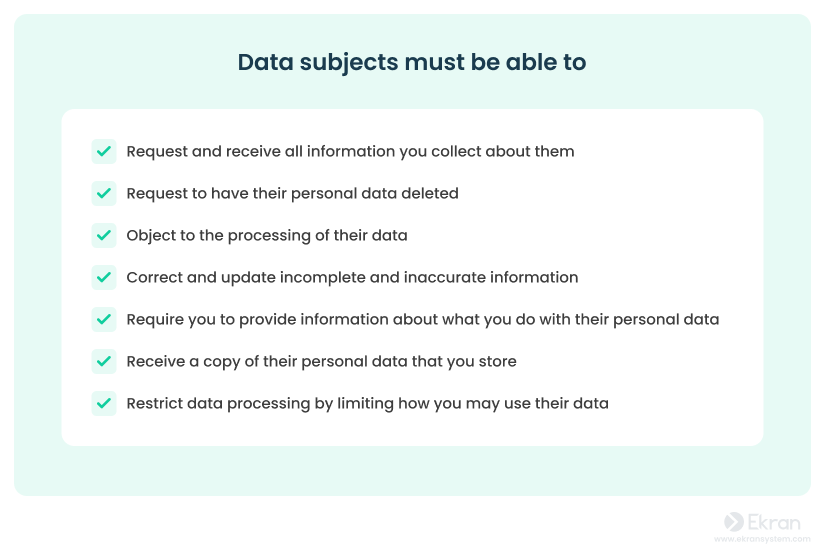

Consider listing data subjects’ rights in your privacy policy. You can visit the GDPR website to take its privacy policy as a reference. Any changes to your privacy policy must be communicated to your data subjects via email.
How to Detect and Prevent Industrial Espionage
6. Document your GDPR compliance
Another essential GDPR requirement is being able to demonstrate compliance to supervisory authorities and prove that all data is processed legally and with all possible security measures applied.
Consider maintaining documentation on how you ensure compliance and personal data security. You can do this in the form of a GDPR diary mapping the flow of data in your organization that is maintained to prove compliance to auditors. In case of a data breach, you can also use your GDPR diary as a reference for improving security.
To help your organization ensure GDPR compliance and accountability, consider keeping the following records:
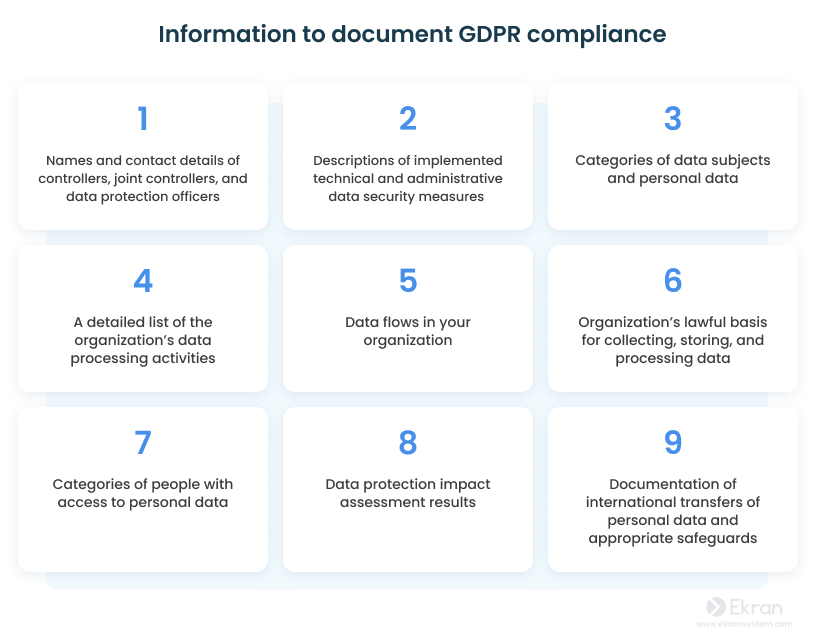

7. Appoint a data protection officer
A data protection officer (DPO) is an in-house or outsourced specialist who oversees compliance IT with requirements and knows how to be GDPR-compliant. A DPO also reports to management about any data breach risks.
The GDPR requires you to hire a DPO if you meet one of three criteria:
- Your organization is a public body or authority, with exemptions granted to courts and other independent judicial authorities
- You perform large-scale, regular processing of personal data
- You process data within special categories
The regulation doesn’t oblige you to hire a DPO on a full-time basis. Depending on the organization, the DPO can work part-time or full-time.
The GDPR assigns six major tasks to the DPO:
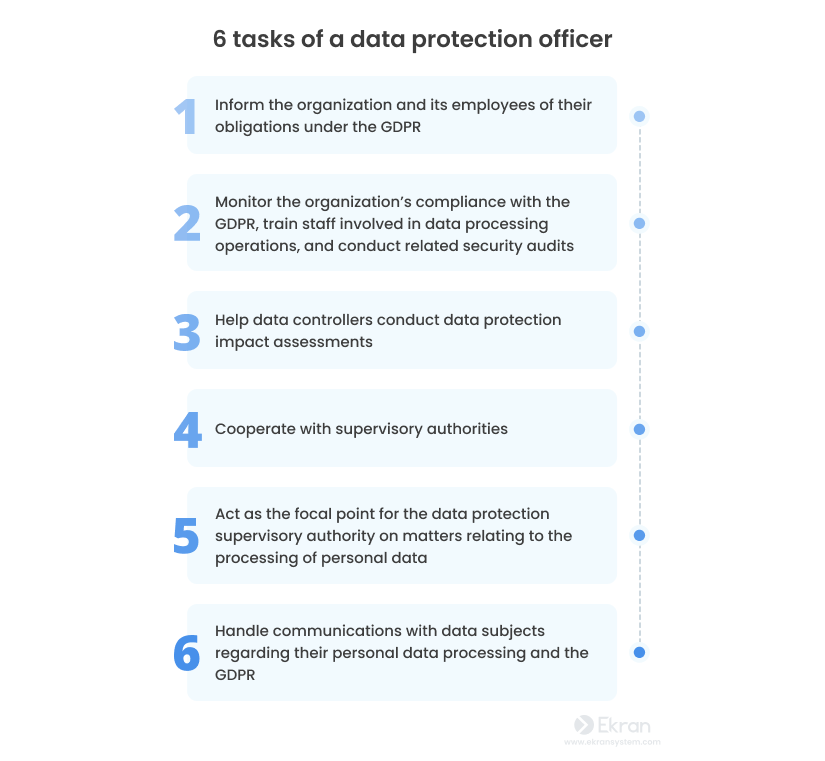

8. Determine your supervisory authority
According to Chapter 6, each EU Member State must provide one or more independent public authorities responsible for monitoring GDPR compliance.
Also referred to as a Data Protection Authority (DPA), a relevant supervisory authority will serve as the primary contact for all GDPR inquiries to your organization.
DPAs are expected to:
- Supervise the application of the GDPR
- Provide expert advice on data protection issues
- Handle complaints related to GDPR violations
- Impose fines for non-compliance on controllers and processors
You can find a list of relevant DPAs on the European Data Protection Board website. Organizations located outside the EU may contact the European Data Protection Supervisor (EDPS) as their supervisory authority.
7 Best Practices for Banking and Financial Cybersecurity Compliance
9. Promptly report data breaches
Article 33 of the GDPR obliges any data controller to notify about a personal data breach within 72 hours of its detection unless the incident is unlikely to harm the rights and freedoms of data subjects.
The regulation also states that data processors must notify data controllers about personal data breaches if such happen. If you have third parties with access to sensitive data, make sure they are aware of this GDPR requirement.
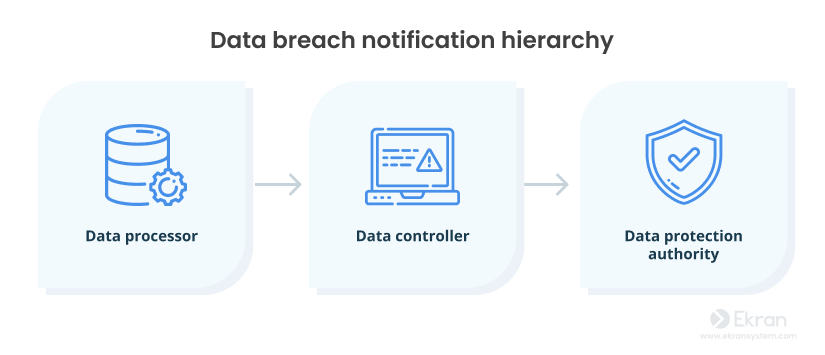

Your notification of the supervisory authority should contain:
- Description of the nature of the personal data breach
- Categories and the approximate number of data subjects and personal records affected
- Possible consequences of the data breach
- Measures the controller took or proposes to take to address the personal data breach and mitigate possible consequences
- Contact details of the data protection officer or another person that can provide more information
Make sure to document details of all breaches of personal data security and measures taken in their regard, as this may help you prove your compliance with the GDPR.
10. Educate your staff about secure data processing
To minimize the risks of data breaches and GDPR violations, make sure all your employees are aware of GDPR requirements, potential cybersecurity threats, personal data privacy, and possible consequences of non-compliance.
You may ensure proper data processing awareness by organizing regular training sessions for your employees. Consider updating training materials regularly as new cybersecurity risks arise. It’s also important to showcase relevant examples of cybersecurity breaches to your staff and discuss possible incident response scenarios.
It’s essential to communicate to your personnel not only the right cybersecurity measures but also reasons for applying them. Employees may not understand certain cybersecurity controls or procedures and may disregard them in favor of convenience.
Data Protection Compliance for the Insurance Industry
Complying with the GDPR requires organizations to spend much time and effort strengthening their data protection measures — not to mention reviewing their entire workflow to make sure personal data is collected, stored, and processed securely and that all employees follow security policies.
Luckily, some tasks for ensuring GDPR compliance can be automated or simplified thanks to dedicated GDPR compliance software.
Using Ekran System to ensure GDPR compliance
Ekran System is a full-cycle insider risk management platform that effectively deters, detects, and disrupts insider threats. Ekran System’s extensive functionality can help you meet GDPR requirements stated in Articles 5, 24, 32, 33, 35, and 39.
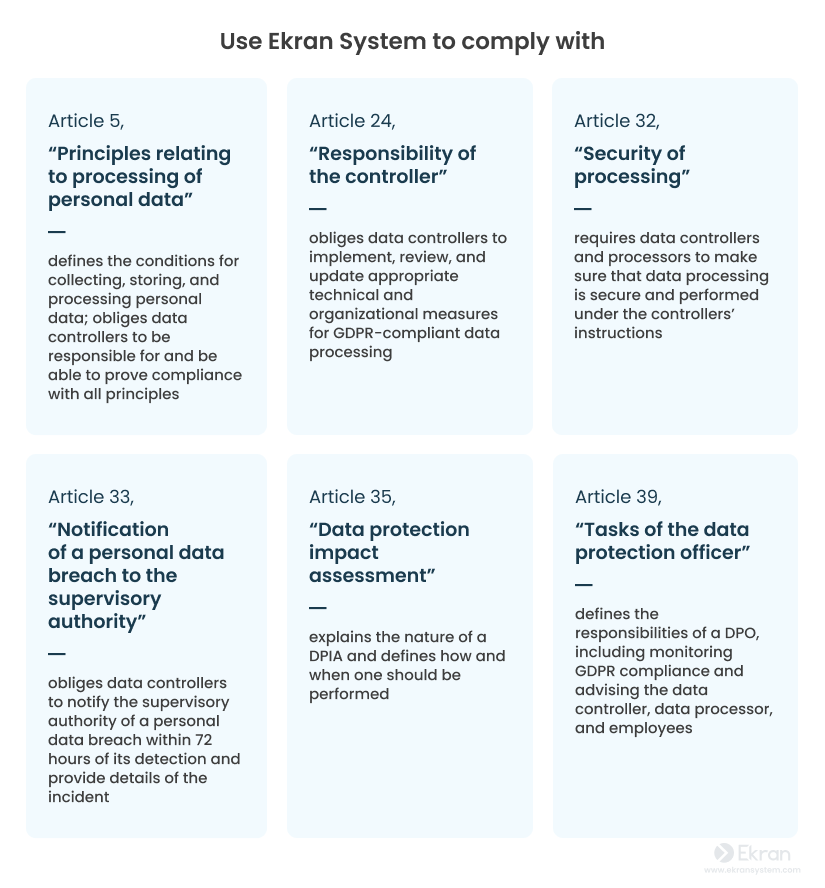

Ekran System can help you achieve GDPR compliance and enhance your organization’s security by providing the following capabilities:
User activity monitoring to ensure that data subjects’ personal data within your organization is processed fairly, legally, and securely by empowering you to:
- Monitor the activity of your employees, privileged users, and third-party contractors
- Record data processing activities in a video format and watch them in a convenient YouTube-like player
- Search in monitored sessions using rich text metadata such as visited websites, used applications, typed keystrokes, and more
- Monitor, control, and block connected USB devices
Privileged access management helps control and secure access to sensitive personal data and resources by allowing you to:
- Verify user identities with the help of two-factor authentication
- Distinguish users of shared accounts via secondary authentication
- Automate and secure password management
- View and granularly manage access rights of all users in your infrastructure
- Provide users with temporary access to sensitive data
Alerts and incident response functionality allows you to detect and prevent potential security incidents in a timely manner by enabling you to:
- Set predefined and custom alerts based on suspicious events such as visited websites, typed keywords, opened applications, and connected USB devices
- Receive instant email notifications when an alert is triggered
- Review a suspicious user session in real time to confirm a security violation
- Automatically or manually stop a suspicious user’s behavior by killing a process or blocking the user’s session
- Detect unusual behavior with the help of an AI-powered user and entity behavior analytics (UEBA) module
Enhanced auditing and reporting in Ekran System can help you demonstrate that data is processed according to the GDPR requirements list by allowing you to:
- Extract information about user activity using a set of customizable reports
- Create a full tamperproof audit trail of all user actions within each monitored session
- Export data in a protected standalone file format for investigation and forensic activities
With such an extensive feature set, Ekran System can help you comply with requirements of other data protection standards, laws, and regulations, such as NIST 800-53, SWIFT CSP, HIPAA, PCI DSS, and FISMA.
PECB Inc. Deploys Ekran System to Manage Insider Threats [PDF]
Conclusion
Our data protection compliance checklist can help you meet major GDPR requirements, select proper cybersecurity tools, and improve your overall data protection measures.
By opting for Ekran System, you can automate monitoring and reporting processes in your company and simplify progress towards GDPR compliance. In addition, Ekran System’s insider risk management functionality can help you secure access to sensitive data, instantly detect suspicious activity, and address potential threats before they become a problem.
To test all of the above for yourself, experience Ekran System with a free 30-day trial.





